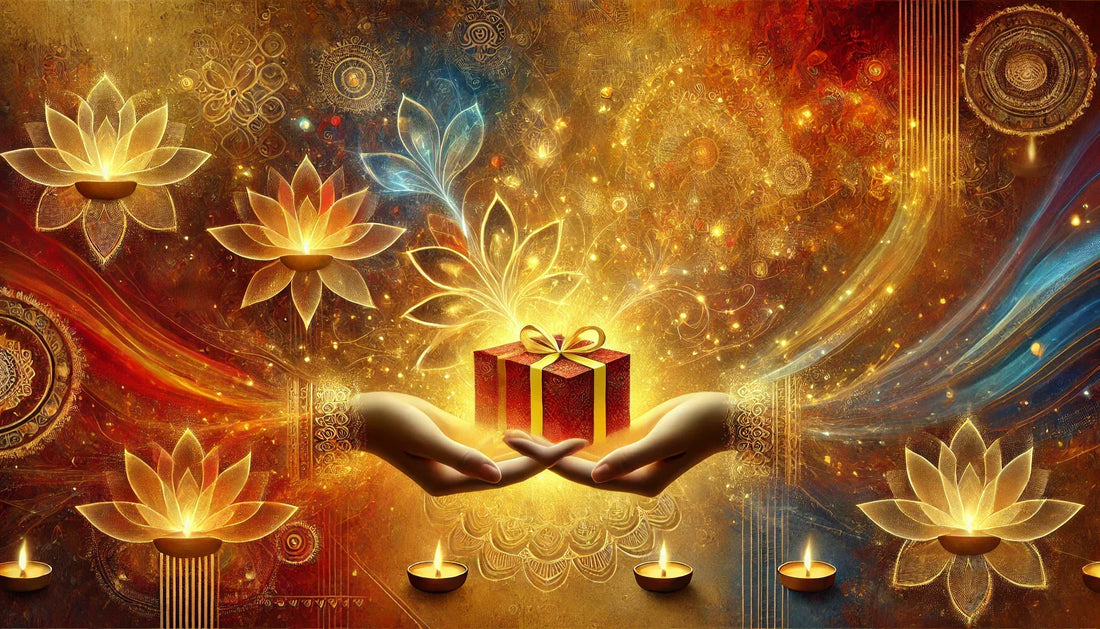
Beyond the Material: The Emotional Value of Gift-Giving in Indian Culture
Share
Check Out All The Handcrafted Indian Traditional Board Games Here
Gift-giving is an intrinsic part of Indian culture, steeped in tradition, emotion, and deep-rooted social significance. While material value plays a role, the essence of gifting in India extends far beyond the object itself—it is an expression of love, gratitude, and a means of strengthening relationships. From festivals and weddings to personal milestones, the act of giving is infused with sentiment and cultural meaning.
The Cultural and Emotional Foundations of Gift-Giving
In India, the tradition of giving is woven into the fabric of everyday life. Whether it’s exchanging sweets during Diwali, offering betel leaves and areca nuts during a wedding, or presenting a teacher with a coconut and shawl as a token of respect, every gift carries a symbolic message. The essence of this tradition lies in ‘Dana’—the concept of selfless giving in Hindu philosophy, which is considered an act of virtue (punya). According to the Bhagavad Gita, true giving should be without expectation of return, a belief that continues to shape gifting customs in India today.
Expressions of Love and Gratitude
Gift-giving serves as an emotional bridge, connecting hearts across generations. Indian families emphasize thoughtful and meaningful gifts over extravagant ones.
-
A grandmother passing down her handcrafted silk saree to her granddaughter isn’t just transferring fabric but weaving a legacy of love and memories.
-
Parents giving their children a handcrafted wooden toy or a traditional board game such as Chowka Bara is a way of sharing childhood nostalgia while instilling cultural heritage.
-
A friend presenting a book of scriptures or a handmade artifact signifies respect and goodwill.
These gifts transcend their material value; they embody deep emotions and relationships.
Festivals: The Art of Thoughtful Giving
Festivals in India are synonymous with gifting. Each festival has its unique tradition of gift exchange, reinforcing social ties and familial bonds.
Diwali – The Festival of Prosperity
During Diwali, gifts symbolize prosperity, luck, and happiness. Families exchange sweets, dry fruits, silver coins, and decorative items as an expression of good wishes. Many also choose meaningful gifts such as handcrafted items that reflect Indian heritage.
Traditional board games like Navakankari or Aadu Huli make for thoughtful Diwali gifts, rekindling childhood memories and fostering bonding over play.
Raksha Bandhan – The Bond of Siblings
Raksha Bandhan celebrates the love between siblings. While sisters tie the sacred rakhi, brothers reciprocate with gifts, often choosing items that hold personal significance—jewelry, books, or handcrafted keepsakes. It’s not about the price but the thought behind it.
Weddings – A Symbol of Blessings and Continuity
In Indian weddings, gifting is an elaborate affair, representing blessings for a prosperous future. Gold jewelry, silk garments, and handcrafted artifacts are gifted to the bride and groom, symbolizing wealth, fertility, and stability. It is also customary for families to gift meaningful items such as handmade Pattachitra paintings or temple-style jewelry, which hold cultural and spiritual significance.
Handmade and Traditional Gifts: A Reflection of Emotion
Handmade gifts carry an added layer of warmth and authenticity. They embody personal effort, thoughtfulness, and a deep connection with Indian traditions.
-
Handcrafted puzzles like Eka Shloki Ramayana serve as engaging and educational gifts, helping children connect with Indian mythology.
-
Handwoven textiles such as Banarasi sarees, Pashmina shawls, and Madhubani dupattas convey craftsmanship and heritage.
-
Traditional games like Pagade promote storytelling and nostalgia, making them perfect gifts for families who cherish heritage-based play.
Corporate and Personal Gifting: Building Stronger Bonds
The corporate world in India has also embraced gifting as a means of fostering relationships. During Diwali, companies present employees with tokens of appreciation, ranging from silver coins to personalized gift hampers.
Similarly, in personal relationships, gifting is an expression of care. A well-thought-out gift—be it an artisanal tea set, a beautifully illustrated activity book, or a jigsaw puzzle depicting Shri Rama Pattabhisheka—can strengthen bonds and create lasting memories.
External Insights: The Psychological Aspect of Giving
Research suggests that giving gifts enhances emotional well-being. According to a study published in the Journal of Consumer Research, the joy derived from giving often surpasses that of receiving. This aligns with India’s spiritual philosophy, which emphasizes ‘seva’ (selfless service) and generosity as means to personal fulfillment.
Harvard Business School researchers also found that people experience a longer-lasting happiness boost when spending money on others rather than on themselves (source). This further reinforces the idea that gifting is more than a transaction—it’s an emotional investment.
The Heartfelt Legacy of Indian Gifting
In Indian culture, gifts are not merely objects; they are carriers of emotion, tradition, and love. Whether it is a simple offering of sweets, a handcrafted board game, or a heritage-rich textile, the act of giving conveys care, gratitude, and the intent to nurture relationships. The best gifts are those that tell a story—one of love, culture, and shared experiences.
At Roll the Dice, we believe in the power of meaningful gifts. Our collection of traditional board games, puzzles, and activity kits offers a bridge between nostalgia and modernity, making them perfect gifts for every occasion. Explore our range of cultural treasures and give the gift of heritage, joy, and connection.
